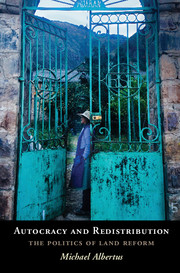Book contents
- Frontmatter
- Contents
- List of Tables
- List of Figures
- Acknowledgments
- 1 Introduction
- 2 Actors, Interests, and the Origins of Elite Splits
- 3 A Theory of Land Reform
- 4 Measuring Land Reform
- 5 A Cross-National Analysis of Land Reform in Latin America
- 6 Elite Splits and Redistribution under Autocracy: Peru's “Revolution from Above”
- 7 Land Reform Transformed to Redistribution: Venezuela's Punto Fijo Democracy and Chávez's Bolivarian Revolution
- 8 Latin America in Comparative Perspective
- 9 Conclusion
- References
- Index
- Other Books in the Series
2 - Actors, Interests, and the Origins of Elite Splits
Published online by Cambridge University Press: 05 October 2015
- Frontmatter
- Contents
- List of Tables
- List of Figures
- Acknowledgments
- 1 Introduction
- 2 Actors, Interests, and the Origins of Elite Splits
- 3 A Theory of Land Reform
- 4 Measuring Land Reform
- 5 A Cross-National Analysis of Land Reform in Latin America
- 6 Elite Splits and Redistribution under Autocracy: Peru's “Revolution from Above”
- 7 Land Reform Transformed to Redistribution: Venezuela's Punto Fijo Democracy and Chávez's Bolivarian Revolution
- 8 Latin America in Comparative Perspective
- 9 Conclusion
- References
- Index
- Other Books in the Series
Summary
This chapter begins laying the foundation for a theory of land reform. I first define the main political actors that impact reform outcomes: landed elites, ruling political elites, and the rural poor. I detail how these actors are constituted and what their preferences are. Although I focus on these actors in the Latin American context, their relevance is far from limited to this region. I consequently provide extensions regarding how to conceive of them in other contexts.
This chapter also examines in depth the origins of splits between landed and ruling political elites. While much of the current general theory on redistribution collapses elites into one monolithic actor, I argue that splits among elites are crucial for providing the incentives for land redistribution. Furthermore, elite splits are far from uncommon. I demonstrate that a range of circumstances can give rise to splits between landed elites and ruling political elites: drives for state autonomy (especially by the military or by secularizing and developmentally oriented political elites), a diversifying economy, ethnic difference, and foreign occupation. Recognizing these splits brings us closer to explaining observed patterns of redistribution. And theorizing where elite splits originate is a major step toward understanding the deeper political origins of redistribution.
Landed Elites, Ruling Political Elites, and the Rural Poor in Latin America
From the time of colonization until the early twentieth century, most Latin American countries were characterized by extreme social and economic inequality rooted in the skewed distribution and use of land. More than half of the population in Latin America was rural until 1960. Yet the vast majority of rural laborers were poor. The poorest half of rural workers in most countries throughout the region typically held less than 5 percent of the land. Landed elites, by contrast, were very powerful. The richest 2–3 percent of large landowners typically commanded ownership of most of a country's land. Landed elites also used their authority to influence the behavior and even the movement of the rural workers who lived on their estates (Baland and Robinson 2008; Barraclough 1973). Against this backdrop, there was also a turbulent political environment. Frequent political transitions in many countries brought to power political elites with widely divergent coalitions and agendas.
- Type
- Chapter
- Information
- Autocracy and RedistributionThe Politics of Land Reform, pp. 26 - 59Publisher: Cambridge University PressPrint publication year: 2015



